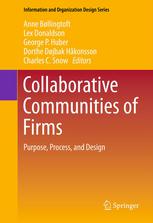

Most ebook files are in PDF format, so you can easily read them using various software such as Foxit Reader or directly on the Google Chrome browser.
Some ebook files are released by publishers in other formats such as .awz, .mobi, .epub, .fb2, etc. You may need to install specific software to read these formats on mobile/PC, such as Calibre.
Please read the tutorial at this link: https://ebookbell.com/faq
We offer FREE conversion to the popular formats you request; however, this may take some time. Therefore, right after payment, please email us, and we will try to provide the service as quickly as possible.
For some exceptional file formats or broken links (if any), please refrain from opening any disputes. Instead, email us first, and we will try to assist within a maximum of 6 hours.
EbookBell Team

4.3
48 reviewsFaced with the ever-accelerating pace of technological change and the restructuring of markets, many firms have been questioning the appropriateness of their own organizational structure and effectiveness. Consequently, we have witnessed much organizational experimentation and the development of new forms of organizing over the last decade. Firms are more dependent than ever on the need for continuous and radical innovations – and often innovations that go beyond their existing businesses. This challenges firms in terms of knowledge and idea sharing, and often necessitates the need to expand beyond the boundaries of the single firm for multi-party collaboration to meet serious challenges and develop creative solutions.
Drawing from the Fourth International Workshop on Organization Design, and featuring contributions from an international array of specialists, this volume focuses on the expansion beyond the boundaries of the single firm and multi-firm networks, to include, for example, community-based organization designs. A community is a connected set of firms; the connections can take on many different dimensions. For organization design theory, community-based organizations have many implications. For one, organization design theory has to identify and describe designs that enhance collaborative behavior among firms without restricting the ability of the individual firm to continue to compete within its own marketplace. Moreover, organization design theory also has to identify and describe information processing strategies and designs that allow the continuous generation, sharing, and application of existing information and knowledge.
The development of effective collaborative community designs is critically important to the global economy because, increasingly, our future depends on pursuing shared goals and sustainably developing our global commons. Ideally, the ideas and findings in this book will contribute to increased attention to new organization designs capable of meeting 21st-century opportunities and challenges.